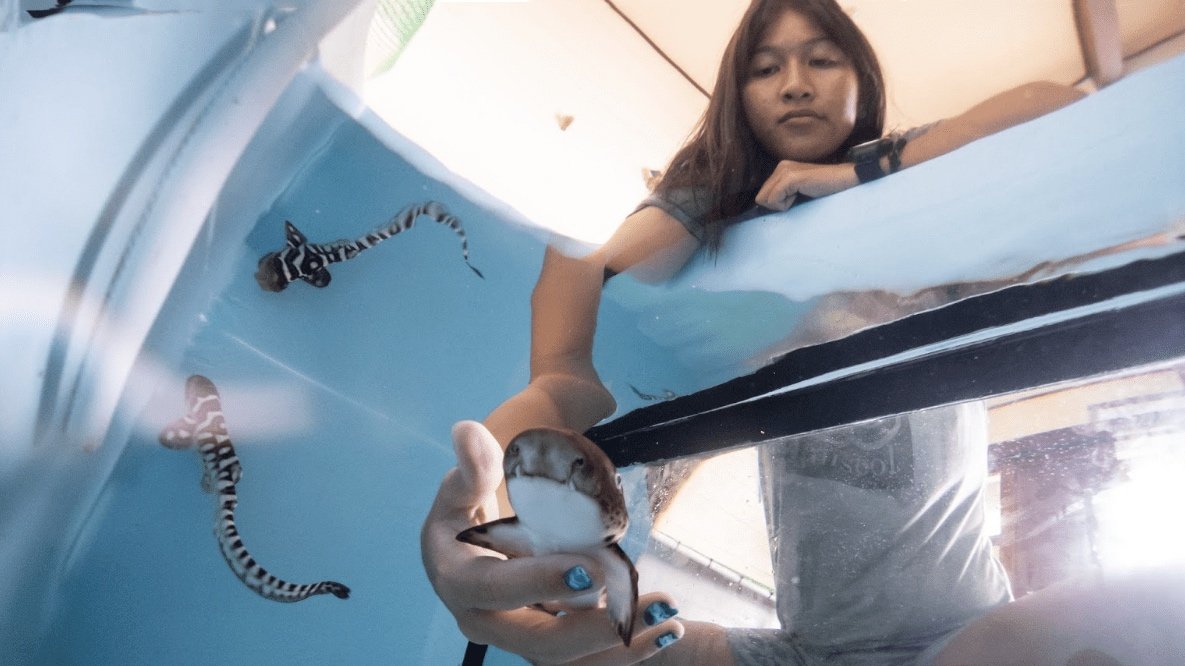“Here’s how I became a shark nanny”: Kyra Wicaksono
Written by Kyra Wicaksono (Shark Aquarist, Misool Foundation)
First published in Bird’s Head Seascape
For those who might wonder about how I landed the coolest job in the world, a ‘shark nanny’, here’s my story:
I grew up in the middle of Jakarta, the capital and most crowded city in Indonesia, with little to no access to the ocean. Because of this, I have always been easily fascinated by watching wildlife on television. Wanting to see more of what nature offers became a growing passion, and I applied to the Department of Biology at Universitas Indonesia. A defining moment in my academic journey occurred during the Marine Ecology course. This course required me to do an underwater survey, while snorkeling, at Pulau Pari (north of Jakarta). Sadly, the poor water quality of the ocean around Jakarta’s prevented me from actually witnessing any marine life, prompting me to obtain a diving license. This decision broadened my capabilities and deepened my commitment to preserving marine ecosystems. Long story short, after completing my studies, I joined the Misool Foundation in 2018 as an intern before becoming a research staff member the following year.
Kyra (second from left) during her dive training in 2017. Photo by Kyra Wicaksono.
The initial introduction to the StAR Project came my way in November 2021, while I was doing a Baited Remote Underwater Video (BRUV) study to assess shark and ray diversity in Misool Marine Protected Area (MPA). Knowing I had a particular interest and experience in shark and ray conservation, Kiki, the Dive Center Manager at Misool Resort and a good friend of mine, reached out to me about the project. At that point, the StAR Project was still under wraps, and ReShark had not even been born. Kiki asked me if I’d be interested in taking on the role of Misool’s ‘shark nanny’. I remember thinking: “Well, that is the weirdest job title to put on a CV” but I was hooked instantly. The prospect of being part of a groundbreaking shark re-population project, the first of its kind, felt like a tremendous privilege.
The next step was the month-long training at Jakarta Aquarium and Safari (JAQS) in March 2022, conducted to train the designated ‘shark nannies’ for the StAR Project in Misool and Kri. JAQS developed a comprehensive curriculum, categorizing procedures into four main groups: husbandry, water quality, life support system (LSS), and veterinary.
The training aimed at endowing aquarists with a spectrum of skills, encompassing, but not confined to, observing leopard sharks and meeting their nutritional requirements, monitoring and ensuring an environment conducive to every stage of the sharks’ life, mastering the intricacies of system installation and daily maintenance, employing safe shark handling techniques, and collecting essential biological samples. The goal was to cultivate a versatile skill set that transcended routine tasks, preparing the nannies for the diverse responsibilities demanded by the StAR Project. Certainly, the nannies play a crucial role in engaging with global partners and facilitating outreach programs for both international tourists and local communities. Therefore, possessing proficient English skills is essential for effective communication in these tasks.
Kyra (center) at the Jakarta Aquarium and Safari, where the aquarists underwent a month-long training program. Photo by Indo-Pacific Films.
Fast forward to the post-training era, we built Misool’s nursery in just eight days!
Following the construction, I visited the RARCC nursery in Kri for a month to receive on-the-job training under Leah Neal and Jack Jewell from the international husbandry team. We also welcomed our first delivery of eggs from SEA LiFE Sydney Aquarium and Shark Reef Aquarium at Mandalay Bay.
Oh, and the highlight? We nailed capturing our first leopard shark, Mali, hatch on video – a total showstopper and also the fourth shark to be released as part of StAR and the first to be released in the Misool Marine Reserve. After her release, we got busy downloading data from the 15 acoustic receivers around the Misool Marine Reserve.
After Mali’s release, we got busy downloading data from the 15 acoustic receivers around the Misool Marine Reserve.
Reaching this point often makes me reminisce about the old days when my parents were hesitant about my decision to leave for Misool. Truth be told, I only informed them a week before departing. As they say — it’s easier to seek forgiveness than permission, right? After six years of getting used to seeing me at home only three times a year, they have become incredibly proud parents. They even jokingly refer to themselves as “shark grand-nannies”.
Where am I now? Still happily residing at Misool Resort, taking care of our latest and BIGGEST batch of 10 shark eggs, shipped by the Cairns Marine team in Australia (read our previous story). Please note that I’m not the sole ‘shark nanny’ on this journey. Presently, the StAR Project has a team of six incredible nannies: Shannon (Pekanbaru, Sumatra), Dolly (Sorong, West Papua), Mary (Manokwari, West Papua), and Clara (Makassar, South Sulawesi) who are based at the Kri nursery, and Agi (Jakarta) stationed in Misool with me.
Kyra attending to the zebra shark pups at Misool Foundation nursery. Photo by Pambajeng Putro.
While this project offers a glimmer of hope for the leopard shark population in Raja Ampat, I am certain it will also take the nannies to places. Julia, our former nanny at RARCC, is currently pursuing her master’s degree at Texas A&M University, researching the effect of water parameters on the growth of zebra shark pups in aquariums compared to our nurseries. Additionally, I aspire to deepen my knowledge in marine conservation at the earliest opportunity as this project continuously presents windows of possibilities for advancement.
Are you eager to become a part of our team and get the chance to meet adorable zebra shark pups while also aiding in the recovery of their population? The StAR Project offers opportunities for Indonesian citizens. For more information on current vacancies, please visit our website at www.reshark.org/opportunities.
***
Kyra would like to express her sincere gratitude to the entire constellation of partners and supporters of the StAR project, with special thanks to the West Papua government (Prof. Charlie Heatubun and his team at BRIDA) for their leadership of this ground-breaking project, to our partners in the Ministry of Marine Affairs and Fisheries (KKP) and the Indonesian National Research and Innovation Agency (BRIN) for their strong support in enabling the importation of all of our precious leopard shark eggs, and of course to the aquariums producing these eggs. Warm thanks also are due to all of our supporters for their contributions to make the dream of resharking Raja Ampat with leopards a reality!




